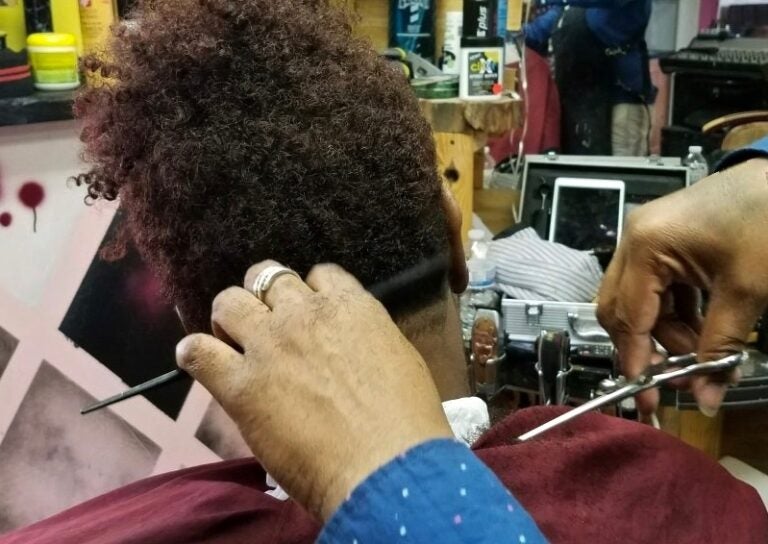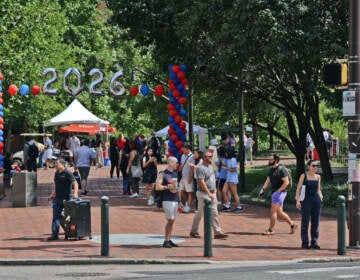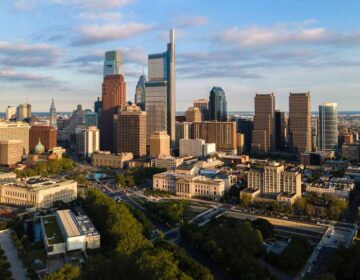Barbers go underground: Getting a haircut on the sly
Barbershops have been closed during the COVID-19 pandemic. But that doesn’t mean barbers aren’t working.

The Pennsylvania government doesn’t consider barbershop essential businesses. But some people who work in them, and who visit, disagree. (Andrea Gibbs/WHYY)
To gain access to those working in, and patronizing, the underground economy during the COVID-19 pandemic, WHYY has allowed some sources to speak anonymously or be identified with only part of their name.
Are you on the front lines of the coronavirus? Help us report on the pandemic.
Since the COVID-19 pandemic began, Brandon has been doing everything right. He follows the guidelines from the Centers for Disease Control and Prevention and wipes down high-touch surfaces, like remote controls and doorknobs, at least twice a day. No guests have been welcomed into the home. And neither he nor his roommate leaves the house unless it’s for essential grocery shopping.
“I’m doing my part,” Brandon said proudly.
Brandon even touts that hand sanitizer is always within his arm’s reach, whether at home or in a crowded supermarket. But even with stringent adherence to the rules, Brandon had a breaking point. Last week, he flouted the social distancing mandate and traveled to Northeast Philadelphia for a haircut.
“When I went to get my hair cut, I felt comfortable. I still don’t feel comfortable in Walmart, Target or grocery stores, because of the risk of cross-contamination,” he said. “I walked into the barber’s space, and he’s opening up a fresh razor, and everything has been sanitized.”
Prior to last week, the last time Brandon had a haircut was March 15 — the day before non-essential businesses were ordered closed by Gov. Tom Wolf.
He remembers the date because he books his barber through an app. After nearly two months of socially distancing from a set of clippers, Brandon’s mustache would tickle his nose whenever he laughed. There was so much hair on his face it was getting hard to control, so much that the finance professional turned down an opportunity to appear on Zoom for an April 27 job interview.
Brandon said he was prepared to have gone longer without a haircut, but then he received a compelling text message from his barber, inviting him to join an exclusive cohort of customers whom the barber is welcoming into his home for a trim.

Get daily updates from WHYY News!
When Wolf declared and later extended the stay-at-home order, only certain “life-sustaining” businesses – healthcare and medical providers, news media and law enforcement, among a few others – were deemed essential. Barbershops, salons and beauty shops were not.
“Barbershops and beauty salons should still be open,” said one unlicensed barber in South Philadelphia, who has been allowing select customers into his home. “We’re trained to sanitize, and to treat everyone as if they have an infectious disease.”
In North Carolina this week, Republican Sen. Phil Berger pushed for counties to be able to allow barbershops and salons to reopen, citing 25 other states, including nearly every state in the Southeast, that have accommodated such businesses during the pandemic. Delaware allowed salons and barbershops to reopen last week and some drew a steady stream of customers. But in Pennsylvania, they aren’t even included in the yellow phase of the state’s three-stage reopening plans.
“It would’ve been nice if the government deemed barbershops essential to make sure those self-employed professionals could earn an income, but with some provisions,” said Brandon, noting his barber has offered him a standing bi-weekly appointment since he became a customer eight years ago.
The unlicensed barber, who has cut hair on-and-off for 30 years, acknowledges that house calls put his health at risk.
“My health requires me to make some money, too. Am I taking a risk? Hell yea,” the barber said. “But I’m making sure I’m as safe as possible.”
Barbicide, a disinfectant solution used for grooming tools often found soaking combs in shops, has a new COVID-19 certification course. And according to the unlicensed barber, it’s easy to obtain a passing grade.
“It’s a 10-minute test and then you’re COVID ready,” he said.
Mr. Williams, a licensed barber who is asking that we not use his full name, said his shop has always been prepared for a virus outbreak. The barber stations are more than six feet apart, and only a certain number of customers are allowed in at a time, he said.
He has been cutting hair during the pandemic by appointment only. And though Mr. Williams wears a mask when interacting with customers, and sanitizes his tools after every cut, he doesn’t believe the coronavirus is deadly.
“It’s propaganda,” he said.
To date, more than 82,000 individuals in the United States have died from COVID-19, and close to 1.5 million people have tested positive. However, Dr. Anthony Fauci, director of the National Institute of Allergy and Infectious Diseases, said the country’s death toll is “almost certainly higher.” Combined, Pennsylvania, New Jersey and Delaware have seen more than 14,000 deaths, but reporting by WHYY shows the counts are likely much higher locally.
“I don’t think coronavirus is as dangerous as they say. On the other hand, I do want to err on the side of caution. But I don’t trust the government,” said the unlicensed barber.
Brandon said he does think the coronavirus is something that people need to take seriously. But, to him, “getting a haircut is the same as going to get essential groceries. In fact, maybe it’s less risky.”
WHYY is your source for fact-based, in-depth journalism and information. As a nonprofit organization, we rely on financial support from readers like you. Please give today.






